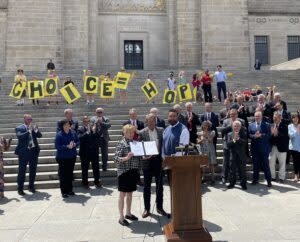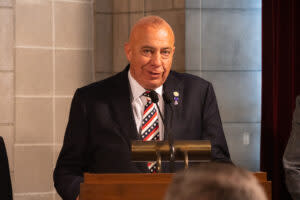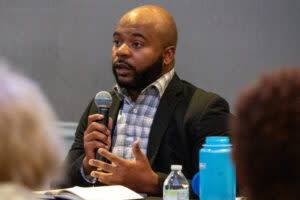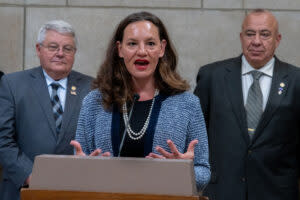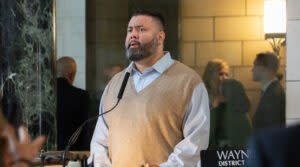Flurry of 100+ new laws are taking effect in Nebraska
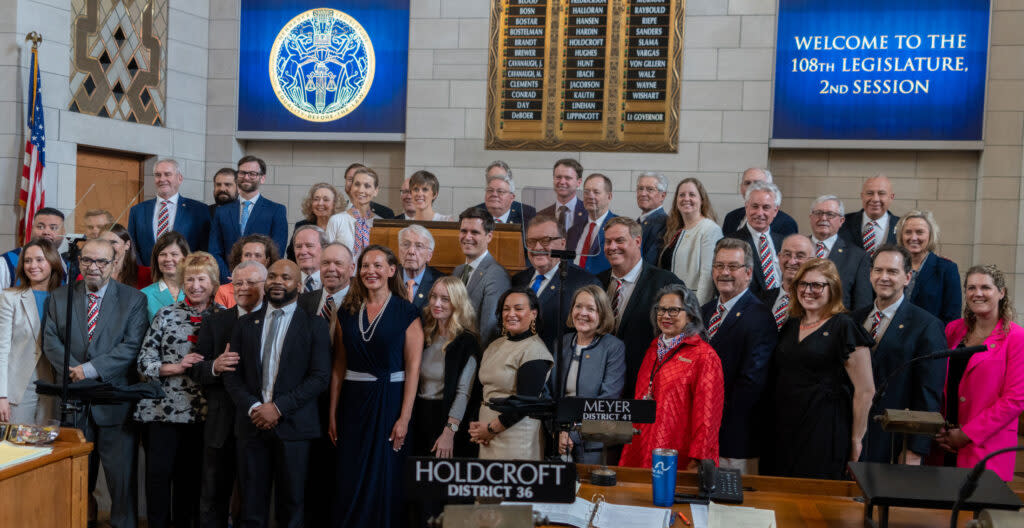
- Oops!Something went wrong.Please try again later.
- Oops!Something went wrong.Please try again later.
- Oops!Something went wrong.Please try again later.
Lawmakers gather on the last day of the 2024 legislative session, though many expect to return for a special session later this year. Not pictured: State Sens. Joni Albrecht, Ben Hansen, John Lowe and Tony Vargas. April 18, 2024. (Zach Wendling/Nebraska Examiner)
LINCOLN — A flurry of new state laws took effect Friday, establishing new policies for firearms in small schools, launching Parole Board reforms and expanding open government and voting rights.
Of the 150 bills signed into law this year, more than 100 became effective last week. Some took effect in the spring while others won’t get the green light until July 1, 2025.
Here is a breakdown of some of Nebraska’s newest laws.
Changes coming to the schoolhouse
Legislative Bill 1402, from State Sen. Lou Ann Linehan of Elkhorn, sets aside $10 million for the state treasurer to distribute private K-12 scholarships to prospective students.
As of Oct. 31, the law will repeal its predecessor: LB 753, a one-to-one tax credit, capped at $25 million, that used scholarship-granting organizations to route funds to students and families.
Public school advocates are again seeking to block LB 1402, as they tried with the previous version. The Support our Schools ballot committee submitted signatures July 17, again seeking access to the November ballot to decide the fate of LB 1402.
LB 1329, an Education Committee package, in part authorizes school boards to create a written policy for security personnel and off-duty law enforcement to carry firearms on school grounds or at school-sponsored activities. State Sen. Tom Brewer introduced the proposal in LB 1339.
The policy must specify personal qualifications, training, appropriate firearms and ammunition, and appropriate use of force.
The State Board of Education will develop a model policy in consultation with the Nebraska State Patrol, including the appropriate number of training hours for security personnel.
The law doesn’t include Class III, IV or V public school districts, or districts of at least 5,000 or more people.
The committee package also included LB 1385, from State Sen. Kathleen Kauth of Omaha, to streamline the application process to expand teaching certificates and explain how teachers could earn additional endorsements. It also creates license reciprocity with other states.
Also included in LB 1329 were bills to prohibit debt collection agencies and interest charges for students’ unpaid breakfast and lunch accounts (LB 855 from State Sen. Danielle Conrad of Lincoln); to limit the use of mercator maps in K-12 classrooms beginning this fall (LB 962 from State Sen. Justin Wayne of Omaha) and to allow school boards to levy additional property taxes for school safety infrastructure concerns (LB 1012 from State Sen. Lynne Walz of Fremont).
Workforce and economic development
LB 16 has been described as a “comprehensive rewrite” of the state’s occupational licensure policies. Conrad took up the bill after its introducer, former State Sen. Tom Briese of Albion, resigned to become state treasurer.
The legislation provides additional ways to license and recognize licenses from experienced workers who move to Nebraska from other states.
LB 16 also includes language to allow interior designers to join a voluntary registry for their profession. Brewer introduced those provisions in LB 471.
Lawmakers are taking steps to eliminate poverty in Lincoln and Omaha through LB 840, from State Sen. Terrell McKinney of Omaha. It requires both cities to submit a five-year poverty elimination action plan by July 1, 2025.
That document must include goals for poverty elimination in certain areas and plans to use federal, state and local incentives to eliminate poverty in those areas.
Another bill applying to just Lincoln and Omaha officials is LB 1358 from State Sen. Mike McDonnell of Omaha, which was amended into and passed in LB 1300.
McDonnell’s proposal sets a ceiling for city council members and mayors to increase their salaries: no more than the average percentage change in the unadjusted Consumer Price Index for All Urban Consumers for the period since the last salary increase, plus 1%.
Salaries can’t be increased more than once every two fiscal years.
If officials seek to increase their salaries more than that level, the increase must be the subject of a public hearing, receive supermajority support from the city council and be put to a public vote.
Transparency in government
LB 43, with provisions from Conrad’s LB 366, outlaws special fees for public records requests and doubles the grace period before fees are imposed on records requests, from four to eight hours. Those hours include consecutive time spent “searching, identifying, physically redacting or copying” after a records request.
The changes apply to all Nebraskans and news media.
Recordkeepers could also waive or reduce records fees if doing so is in the public interest or “likely to contribute to the understanding of the operations or activities of government and is not primarily in the commercial interest of the person requesting such records.”
Another provision in LB 43 was Thurston State Sen. Joni Albrecht’s LB 637, which requires every public body subject to the Open Meetings Act to allow members of the public an opportunity to speak at each of their public meetings. This doesn’t include closed sessions.
State Sen. Rita Sanders of Bellevue, who introduced LB 43, also passed LB 71 to modernize a 30-year-old law regarding parental rights in education.
The revisions will expand what educational materials parents can access, in addition to textbooks and tests, such as employee training materials, websites or applications used for learning, digital materials and activities information.
School districts would need to specify how they would “accommodate” — not merely “handle” — parental requests to attend and monitor classes, assemblies, activities or counseling sessions.
Districts must update their policies by July 1, 2025.
Health and safety
State Sen. Jana Hughes of Seward introduced LB 1296 to create a Nebraska-specific registry and list of regulations for vaping products.
Beginning Friday, passed as part of LB 1204, online or other electronic sales for vapes are no longer allowed. Violations are a Class I misdemeanor.
Manufacturers of electronic nicotine delivery systems must complete a certification form and pay a $75 fee by April 1, 2025. The Nebraska Department of Revenue will list all approved manufacturers and products that have been approved for sale beginning Oct. 31, 2025.
The law also cracks down on advertising targeted at minors, outlawing ads or packaging that:
Depict a cartoon-like fictional character that mimics a character primarily aimed at entertaining minors.
Imitate or mimic trademarks or trade dress of products that are or have been primarily marketed to minors.
Include a symbol primarily used to market products to minors.
Include an image of a celebrity.
“What we saw with schools, we saw highlighters, flash drives, that’s illegal, full stop,” Attorney General Mike Hilgers told the Nebraska Examiner. “Even if it is registered, they can’t do that.”
Hilgers worked with Hughes on the legislation and said the “Nebraska-based solution” will help to screen out material that is counterfeit or otherwise not safe for consumers.
Another bill from Hughes, LB 1035, will establish a prescription drug donation program. While no nonprofit has yet been chosen, Hughes has eyed a likely partnership with the Iowa-based nonprofit SafeNetRx, which she visited last October.
Under the law, prescription drugs must be in single-unit doses in original, unopened, sealed and tamper-evident packaging. Nebraskans can already donate to SafeNetRx’s program, but the law opens up a pathway for the medicine to be returned to Nebraska patients.
A DHHS spokesperson said the department is having conversations with SafeNetRx about how the Iowa program can work in Nebraska and about licensing and statutory obligations.
DHHS is also set to coordinate and cooperate with the Public Service Commission to ensure the nationwide 988 Suicide and Crisis Lifeline can be routed to 911 servers, and vice versa. State Sen. John Fredrickson of Omaha introduced that change in LB 929, which passed in LB 1200.
Board of Parole and voting rights
Several changes are coming to the state’s parole system through McKinney’s LB 631.
One major change is limiting the Board of Parole to two reasons for which it may defer parole: if there is a substantial risk that the person would not conform to the conditions of parole or that continued correctional treatment, medical care or training would “substantially enhance his or her capacity to lead a law-abiding life when released at a later date.”
Parole couldn’t be denied solely because the department did not offer needed programming or otherwise delayed programming because of operational issues.
Parole Board members consider whether to grant parole during more than 1,000 hearings each calendar year, and they may be now removed from their post for “neglect of duty.”
That definition includes not attending 12 full days of hearings within a year, which doesn’t include days missed for a medical appointment that couldn’t reasonably be rescheduled or delayed, a family emergency, illness, an act of God or other similar circumstances.
The Parole Board will also need to begin regularly conducting “Parole School” sessions in each correctional facility, so offenders have the knowledge and confidence to successfully navigate the process.
Another proposal, LB 20 from Wayne, “automatically” removes a disqualification from voting rights for any Nebraskans who have completed their felony sentence. The law removed a two-year waiting period for felons after completing their sentence, which had been established in 2005.
Enforcement of LB 20, as well as the two-year waiting period, remains in question after Hilgers issued a formal opinion to Secretary of State Bob Evnen stating that both laws were an unconstitutional encroachment on the authority of Nebraska’s Pardons Board.
The secretary of state, attorney general and governor make up that board, and Pillen had cast doubt on the law in April when he allowed the law to go into effect without his signature.
Hilgers’ opinion doesn’t carry the same weight as the state’s judicial system, and the legislation has not been challenged in the courts.
Conrad, a civil rights attorney, confirmed to the Examiner that thousands of Nebraskans who had been disqualified from registering to vote but were within the two-year waiting period “automatically” had that voting registration disqualification go away as of Friday, per the new law.
More laws that took effect
A slew of other laws that took effect Friday include:
LB 43 (from Brewer’s LB 277) — Prohibits state or local government actions that would “substantially burden” one’s religious rights unless that action furthers a “compelling governmental interest and is the least restrictive means” of furthering that interest.
LB 71 (from Conrad’s LB 1193) — Requires public school districts to allow parents the right to request that their child repeat a grade for select reasons.
LB 140 (Sen. Tom Brandt) — Authorizes the Nebraska Department of Transportation to design Czech Heritage Plates in consultation with the Czech Honorary Consul of Nebraska. An application will be available once the plates are designed.
LB 308 (Sen. Eliot Bostar) — Requires direct-to-consumer genetic testing services to have express consent for the sharing, storage and usage of consumer genetic data. Providers who violate the act could be fined $2,500 for each violation.
LB 664 (Sen. Merv Riepe) — Authorizes the Attorney General’s Office to investigate and prosecute cases of abuse, neglect or exploitation of Medicaid recipients who do not live in an institutional setting.
LB 731 (Brewer) — Allows agency department heads to serve as a member of a reserve component of U.S. armed forces.
LB 870 (Sen. Machaela Cavanaugh) — Adds additional rights to the Sexual Assault Victims’ Bill of Rights Act. One is notification at least 60 days before forensic evidence is intended to be disposed of. Victims can evidence be stored for 20 more years. The other right is for victims to request that they be informed of any status change in their investigation.
LB 876 (Sen. Rick Holdcroft) — Allows Nebraskans not to be prosecuted solely for leaving a baby up to 90 days old in the care of an employee at a state-licensed hospital, staffed fire station, law enforcement agency or emergency care provider. The “safe haven” law previously applied to newborns up to 30 days old at licensed hospitals.
LB 903 (Sen. Wendy DeBoer) — Extends the deadline to Dec. 31, 2024, for the Alzheimer’s Disease and Other Dementia Advisory Council to create a State Alzheimer’s Plan.
LB 904 (from Sen. Anna Wishart’s LB 1178) — Creates the Intergenerational Care Facility Incentive Grant Program for one-time costs to build out child care capabilities.
LB 906 (Riepe) — Increases the penalty for child labor law violations to a Class I misdemeanor and broadens the Nebraska Department of Labor’s ability to investigate suspected violations.
LB 1029 (Conrad) — Clarifies “illness” for acceptable excused school absences to include mental illness in addition to physical ailments.
LB 1092 (Sen. Dave Murman) — Requires websites with more than one-third of their content “material harmful to minors” to require some form of online age verification to block minor users.
LB 1102 (Conrad) — Recognizes Oct. 17 of each year as Nebraska Missing Persons Day. Also included is McKinney’s LB 53, which establishes May 19 of each year as El-Hajj Malik El-Shabazz, Malcolm X Day.
LB 1118 (McKinney ) — Requires mayors in a city of the second class (with population between 801 and 5,000) to have city council approval to remove city officers.
LB 1167 (DeBoer) — Mandates that individuals arrested without a warrant must be brought before a court in the arresting county within seven days.
LB 1169 (Sen. Steve Erdman) — Places History Nebraska, formerly the Nebraska State Historical Society, under the jurisdiction of the governor as a “code agency,” similar to other state departments. The governor has authority in appointing the agency’s director.
LB 1200 (from Sen. Barry DeKay’s LB 966) Prohibits drivers from turning left or right on steady red arrows, in line with a federal traffic manual.
LB 1284 (Walz) Funds training for teachers in computer science. Another bill that was included, LB 1254 from Linehan, sets aside funding for similar reading literacy training.
LB 1300 (from Sanders and McDonnell) — Establishes the Commission on Asian American Affairs, from Sanders’ LB 2. Also included is McDonnell’s LB 1243, which formally creates the Wildland Incident Response Assistance Team in the State Fire Marshal’s Office.
The post Flurry of 100+ new laws are taking effect in Nebraska appeared first on Nebraska Examiner.
